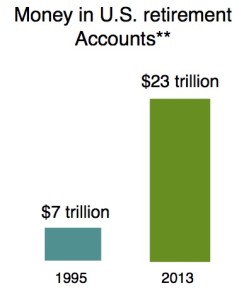How To Start Investing: basics for doing it yourself
Let's say that you are one of the 53% of Americans who haven't invested in the stock market. You've decided it's time to start putting some money aside for the future, but you aren't sure how to get started. What do you need to know to become an investor?
First, don't assume that you need a lot of money to get going. An investor can start with a few dollars or with a few million. What makes you an investor is your willingness to risk your hard-earned cash with someone else in the hopes of getting more in return. For the purposes of this series, I am going to give you the basics of starting an investment account with publicly traded securities—that is, with stocks, bonds and other investments that anyone can buy with a few clicks of a mouse and that, correspondingly, you can sell just as easily. This week and next, I will be posting in more detail about what you need to be thinking about as you get going. Now, though, the basic steps...
1. Choose an investment strategy. Nothing will get an investor into trouble faster than going in without a strategy. Whether you plan to buy stock in your favorite company, invest with a fund manager, take control of your 401k plan or create a portfolio of index funds, you need to decide what your plan is before you invest the first dollar. Learn about some of the most popular strategies in this post.;
2. Choose your investments. That's right—before you open an account, make sure you understand both your strategy and which investments you'll use to put it into action. Just as your choice of strategies will help you eliminate financial advisors or stock brokers who don't make sense for you, your choice of investments will help you eliminate online brokers that charge more for the investments you need or that simply don't provide you with the right support. Not sure how to wade through the sea of investment options? We have upcoming posts on best options for funds, bonds, online platforms and research sources;
3. Opening an investment account. Whether you want help managing your investments or you want to go it alone, there are more choices than ever for opening an investment account. Registered Investment Advisors (RIA's), stockbrokers, online brokerage houses and online advisor platforms each offer you something different. Before you sign up, make sure you know what you are getting for your money and how the fees will work;
 4. Follow your plan. Believe it or not, this is where most investors get caught. It's easy to get lost in the constant stream of stock market information. It is even easier to get lost in the busy pace of life. We often see new clients come to us for help who actually started a great investment plan. They simply lost track of it in the flurry of other concerns.
4. Follow your plan. Believe it or not, this is where most investors get caught. It's easy to get lost in the constant stream of stock market information. It is even easier to get lost in the busy pace of life. We often see new clients come to us for help who actually started a great investment plan. They simply lost track of it in the flurry of other concerns.
Ready? Let's get started.
If you have any questions about financial planning, investment management or any of the topics raised in this blog, feel free to contact Amy at Revolution Capital.


